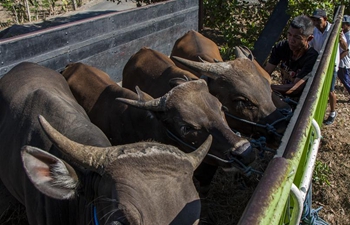WASHINGTON, Sept. 28 (Xinhua) -- Two new studies published Thursday revealed that gut bacteria of mosquitoes can be modified to prevent spread of malaria, a disease that still kills more than 400,000 people each year, mostly children age five and under in sub-Saharan Africa.
The two studies, published in the U.S. journal Science, described two different ways that allow resistance to the malaria parasite to spread easily among mosquitoes.
The findings potentially open the way "for the development of self-propagating malaria control strategies," the Johns Hopkins Bloomberg School of Public Health's Malaria Research Institute, whose researchers were involved in both papers, said in a statement.
"The advantage of this feature is the lesser need to continuously apply malaria control measures such as insecticides and bed nets."
One study, led by both Hopkins researchers and Sibao Wang of the Chinese Academy of Sciences, identified a strain of beneficial bacteria called Serratia AS1, which stably colonize the mosquito gut, where malaria parasites develop.
Unlike other mosquito-infecting bacteria, this strain is easily transmitted from males to females during mating, and from female mosquitoes to their offspring.
Genetically altering the bacteria to produce five potent antimalarial proteins was found to strongly suppress malaria development in colonized mosquitoes, reducing the levels of an early stage form of the parasite by more than 90 percent compared to mosquitoes that didn't contain the modified bacteria.
Further experiments showed that the modified Serratia AS1 bacteria don't have a significant effect on mosquito lifespan or fertility.
"The ability of Serratia AS1 to spread easily among mosquitoes means that it could one day be an effective way to target mosquitoes on a large scale," the researchers said.
"Perhaps one day it could be an effective tool to add to malaria elimination programs."
In the second study, a Hopkins team made small modifications to the DNA of malaria-transmitting Anopheles mosquitoes to boost the activity of immune genes in the insects.
The enhanced immunity made the mosquitoes more resistant to infection by malaria parasites, and thus less likely to transmit the parasites to humans.
What wasn't expected was that the genetic modification also altered the normal mix of bacterial species in the gut of the insects, making them more "attractive" and likely to pass on their genes.
The researchers found that modified male mosquitoes began to prefer unmodified, wild-type females, while wild-type males began to prefer modified females.
"We believe that by changing the microbiota we're changing the scent of modified mosquitoes -- which in turn alters mating preference," said Professor George Dimopoulos, who led the second study.
"It's the perfect change in mating preference in this case, because it maximizes the chances of producing genetically modified offspring when mosquitoes compete for mates."
The researchers said these new findings could lead to developing bacteria and mosquitoes that would be released into mosquito populations in the wild, and would propagate on their own to reduce malaria transmission to humans in endemic areas.
"These strategies are designed to be complementary and would be used in conjunction with things like bed nets and insecticides to diminish the transmission of disease," they said.

















